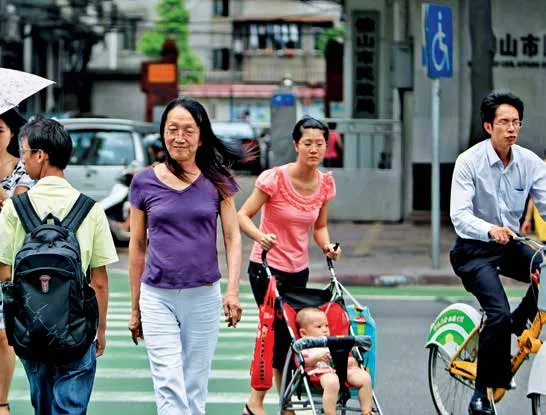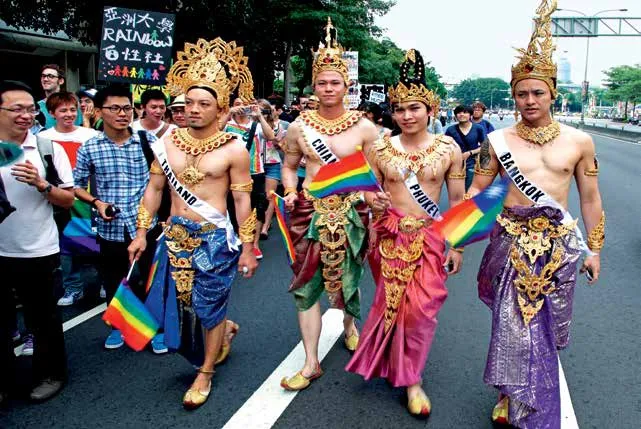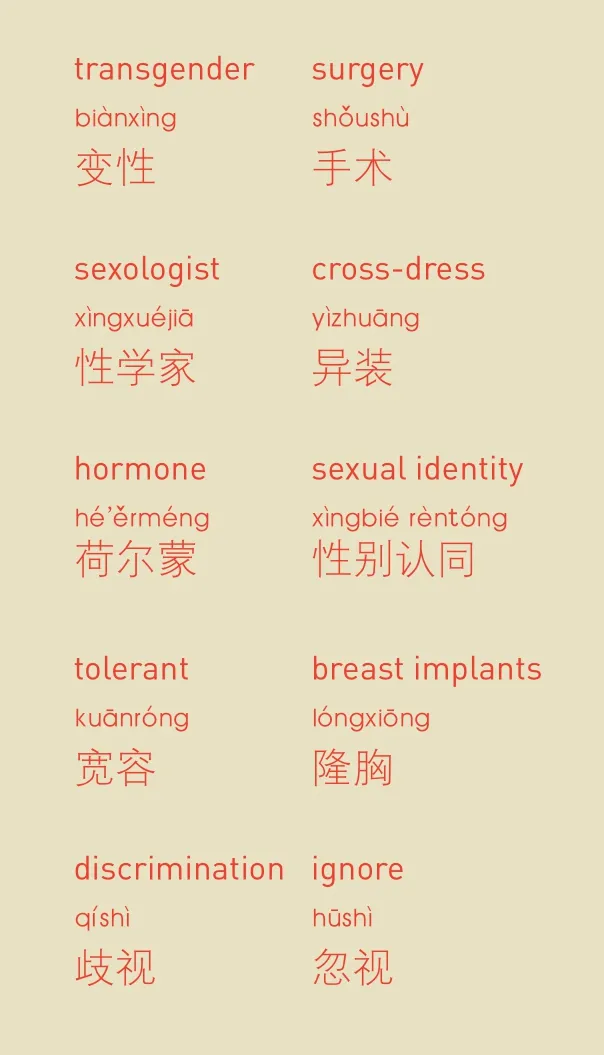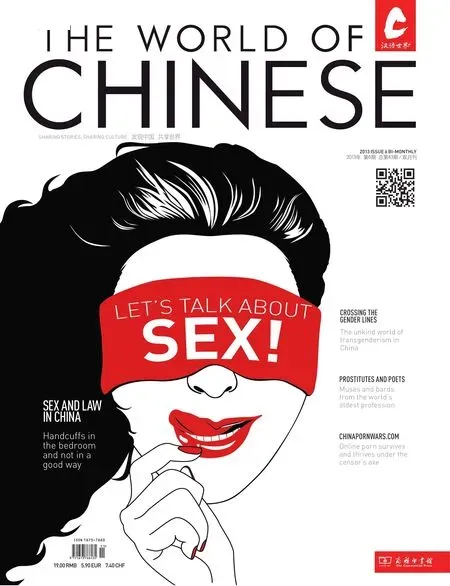CROSSING THE GENDER LINES
2013-08-07BYCARLOSOTTERYADDITIONALRESEARCHBYWEIJINGZHU祝伟婧
BY CARLOS OTTERY, ADDITIONAL RESEARCH BY WEIJING ZHU (祝伟婧)
CROSSING THE GENDER LINES
BY CARLOS OTTERY, ADDITIONAL RESEARCH BY WEIJING ZHU (祝伟婧)
Transgenderism might just be a step too far for China
变性者:离一个宽容、平等、相互理解的社会还远吗?
“What’ve you got for me?” my editor asked. “Transgenderism in China,”I said. “Hm, yeah. That’ll be okay, if you can get first-hand access, of course.” I cockily told him this wouldn’t be a problem. In a country with an estimated 400,000 transgender people, surely a few would be willing to talk. Here in China, I had seen a few trans-people in bars and clubs and figured they could be easily contacted through the various LGBT support networks that exist here in Beijing; or—if all else failed—Craigslist personals.
It all turned out to be not so easy. My first meeting with a Chinese transvestite was confusing. Due to a miscommunication on my part, the woman in question was expecting our encounter to be a far more casual affair. She told me plainly that she was unwilling to be interviewed and that no Chinese transgender was likely to be willing either.
However, she did open up avenues to Filipino transgender people living in China who, she said, would be far more willing to talk.
Jessica (born Robert) from Manila is 24 and speaks with the slightest of lisps and was happy to tell me of her experience, “living in this cruel society of ours”. We met at a Beijing hotel room where she was staying. She wore a snakeskin-print dress set off with a large diamante cross and looked the perfect picture of good health—definitely attractive.
There are various terms in English for transgender people: transvestite, transsexual, ladyboy, shemale, kathooey—those and many other terms that aren’t nearly as forgiving. In Mandarin, there’s 跨性别(kuàxìngbié) meaning “to go beyond sex”; 人妖 (rényāo),“human monster”, an offensive term applied specifically to Thai transsexuals and rarely Chinese transsexuals; and, perhaps most common in the Chinese Mainland, 变性者 (biànxìngzhě), meaning“one who changes sex”. When asked if she felt uncomfortable with any particular label, Jessica briefly sounded like the straightest of males: “You can call me whatever you like. Just don’t call me gay.”
Jessica is proud to be a transgender and doesn’t see her gender as clean-cut or definitive. “Being transgender is good because I have a masculine side. When a man has a problem he deals with it. Women weave their way slowly toward answers. People like me are stronger. We can use both sides of our personalities.”
Regarding the process, Jessica says: “It’s hard to say exactly when I knew I was transgender. I can’t say it was when I was born, because when you’re born, you don’t know about such things. But by the time I was seven years old, I was always playing with girls and not with boys.”
Jessica takes the drug Progynova to develop feminine physical attributes. The drug works as an estrogen boost to induce metabolic changes in males, such as the development of breasts and fat distribution, which affects body shape.

Perhaps China's most famous transexual, Jin Xing poses in her studio

Though living as a woman now, Qian Jinfan was once a dashing young man
Most transgender people report transgender inclinations at a very young age. Transitioning, however, is much more complex, given intense social and societal pressure. Many people remain closeted their entire lives. Once a person decides to transition, one must decide how far they want to go. Wardrobe adjustments? Hormone replacement? Breast implants? Sexual reassignment surgery (SRS)?
Unaware how far Jessica had gone, I inquired coyly asked about her breasts. She pulled down her top and bra and showed them to me, in all their glory—large and magnificent. She demanded that I feel them, as if to prove their authenticity. She had undergone silicone breast implant surgery in Thailand, renowned for having the safest and most advanced techniques in the world that you can get for 1,500 USD. They looked exactly like the real thing, albeit with smaller, slightly mannish nipples.
Jessica feels that SRS is not for her, citing both physical risks, such as surgical infection, and psychological risks.“It’s too psychological. Too psychological.” Jessica believes that, through this operation, the brain and physical sex drive become disconnected, forever altering the orgasm experience. She explained that those who choose to undergo this procedure do so because, “they just really want to feel like a woman.”
In Confucian culture, where fitting-in and honoring one’s parents is paramount, transitioning is so taboo that most ignore the desire altogether. Hailu is a 22-year-old male who has a deep desire to transition to female, but the social pressures won’t let him. Hailu says that from the age of seven, he felt different from everybody else, and, like Jessica, was always more comfortable playing with girls at school. He got bullied accordingly and this left him confused: “When I was small, I had no concept of gender differences; I only knew that I wished I was a girl. I didn’t understand why when girls made feminine gestures nobody laughed, but when I did everybody laughed. They would call merenyao, and I didn’t even know what it meant.”
To some, insults such as this might be ignored as run-ofthe-mill, playground bullying, but it all had devastating effects on Hailu’s confidence, “After a while everything I did, talking, tone of voice, gestures, hobbies—they all become ridiculed.”
Although Hailu knew he wanted to be a woman, he knew nothing about the potential options, such as Hormone Replacement Therapy or SRS, only identifying as transgender after reading a book by China’s leading sexologist, Li Yinhe.
Hailu used to cross-dress in private, but has never done it in public and has now stopped wearing women’s clothes altogether, believing that if he were to transition to a woman it would have to be an all-or-nothingdecision. “I took herbal hormones for a while but not now. Whether it is taking medicine or clothes, it will just be for a moment’s pleasure. When you can’t make the full change, exposing yourself is meaningless.”

Qian Jinfan walks proudly as a woman on the streets of Foshan City
For the time being, Hailu has chosen to ignore his inner femininity publicly and will try to get on as best he can,“Cross-dressing will make you look like an alien, and you will probably lose your job. It’s too uncomfortable for me to interact with men; I can’t act their ways, nor can I talk like them. I don’t want to be like them or learn to be like them anyway.”
While for most transitioning and all the social stigma that comes with it is just not an option, a few select trailblazers are making the choice and on occasion are even making it more publicly acceptable, if only marginally so.
Jin Xing (金星), one of the first people in China to undergo SRS, is undoubtedly China’s most well-known transgender person. Born male, Jin served as a colonel in the People’s Liberation Army. At the age of 28, Jin transitioned to female and later became one of China’s leading ballerinas and choreographers. Despite her achievements and semi-acceptance from the Communist Party, Jin still suffers significant discrimination.
In 2011, Jin was selected as a judge on the Chinese reality seriesWe Are the Music(非同凡响 Fēi Tóng Fǎnxiǎng) but was pulled from judging the final at the last minute, with officials from the Zhejiang Administration of Radio, Film and Television claiming that “transgender identities could have a negative effect on society”.
Transitioning is legal in China. It can only be carried out, however, under stringent guidelines published in 2009, such as registering with the police and being unmarried. The list is long and tortuous, and many believe it is unfair.
While the guidelines may seem draconian to some, the World Professional Association for Transgender Health also recommends: a 12-month preoperative experience living in an identitycongruent gender, hormone treatment, and a written assessment from a mental health professional. Given the physical and psychological impact, SRS is not a decision to be taken lightly by patients or surgeons.
A further discriminating aspect of the transitioning process is that it effectively annuls the educational qualifications of the person in question. Past qualifications no longer match the person’s present gender and become defunct, with local governments not willing to change the educational databases in question. Getting a job is difficult for a transgender person anywhere in the world, but in China if you have transitioned and apply for a job, your qualifications cannot be verified. Many are forced to turn to the gray or black economies for employment.
In recent years, the Chinese media have taken an increasing interest in transgenderism, bringing more positive stories to light. Last year, 84-year-old Qian Jinfan (钱今凡) made national and international headlines in an interview withSouthern Metropolitan Daily, publicly outing herself as transgender. International media dubbed her “China’s oldest transgender”. Born in Zhejiang in 1928 as a male, Qian worked as a calligrapher, art-critic, and government official, spending the first 80 years ofher life as a closeted transgender. In her youth, Qian said she would wear a bra under her clothes, and always walked with a sashay in her step. During the Cultural Revolution, Qian says she felt closer to being a woman, as everybody wore the same clothes.

Activists have fun after an LGBT Pride Parade in Taipei
In 2008, Qian started taking hormone replacement therapy and bravely wrote to her former employers, the Foshan Cultural Radio Television News and Publication Bureau, to explain her reasons for transitioning and her fear that she might lose her pension. To her amazement, her employers were incredibly understanding.
Although society is slowly becoming more tolerant, it was not always necessary in the same way. Professor Josephine Ho, Chair Professor for the Study of Sexualities, National Central University, Taiwan, is a formidable academic—viewed by many as the godmother of the Taiwanese Queer Movement—and has written extensively about transgenderism in China. According to Professor Ho, cross-dressing, if not outright trangenderism, has a long and rich history in Chinese culture: “It was deemed as performance, a casual, momentary breaching of the gender boundary. It wasn’t until the modern era when the sexes began to mingle in public, that gender divisions [as we know them today] became more strictly upheld. ”
As in the case of Qian Jinfan, Jin Xing, and the world over, as far as transsexuality is concerned, it is usually males-to-females that are the object of fascination. The Chinese documentaryBrothers(《兄弟》Xiōngdì), directed by Yao Yao (妖妖) differs, and tells the story of Tony, a female-to-male transgender person as he begins his journey to undergo a sex change. Initially Tony was wary of making the film but decided to speak out when one of his friends—also a female-to-male transgender person—suffered horrifying abuse at the hands of his family. His friend saved enough money to have a mastectomy, thus flattening his chest, but when his parents found out they forced him to have breast implants and arranged a man from the same village to rape him, an attempt to“normalize” him.
During the film Tony says, “Everybody always talks about LGBT, but nobody cares about the T. Nobody even knows what it stands for. What about the T?”
In some sense, Tony’s words are understandable, in a society that is barely beginning to grapple with the social realities of homosexuality, transgenderism might just be a step too far. And at this juncture, many transgender people are choosing to live quietly outside the limelight deciding against demanding more rights, opting to stay under the radar instead.
Looking at homosexuality over the last two decades, a huge number of activists campaigned loud and proud, doing anything within their power to get closer to equality. But it wasn’t always like that; in the past many of the morecloseted homosexuals would criticize their “out” counterparts for bringing unnecessary attention upon them, making it more difficult to live their lives. The situation is somewhat analogous with the transgender community in China today. As director Yao says, “Transgender people may hate Tony for making the group public because most of them want to conceal their identities.”
This chimes with Guo Yanan, a transgender coordinator at Aibai Culture and Education Centre (爱白文化教育中心, a non-profit organization that serves the Chinese LGBT community) , who says that while we hear the occasional positive transgender story in China, “at the same time, after an operation many transgender people decide to take a new identity; they will be completely out of their circle from the past. They will change their address and work and are no longer willing to contact with old friends.” Accordingly, it is rare to come into contact with positive stories about transgender causes. They prefer to live alone, accepting their lot.
If Chinese transgender people are not yet willing to make a stand for themselves, it then raises question, who else will? LGBT groups are always looking to take up the mantle, with “Increasing Transgender Visibility in China” always high on the menu, but is increased visibility really what they want? Others demand an increase in government awareness, insisting on enhanced legal rights, but Professor Ho is unsure about this approach: “There is a recent trend in the transgender movement hoping that legal reforms in regard to change of identity papers and benefits for transgenders would make their lives normal and perfect. This of course does not touch the deeply-rooted prejudice surrounding sex and gender. Blind faith in the state and the laws is quite damaging for those pushing for more thorough changes in society.”
China famously removed homosexuality from its list of mental disorders in 2001, and this has, of course, led to significant changes in the way Chinese society views being gay. The destigmatization has been slow but steady. I asked Guo if she felt this would be helpful if this happened for transgenderism in China. She was quick to point out this is less an issue for China than the whole world.
In spring of this year, the latest edition of theDiagnostic and Statistical Manual of Mental Disorders(DSM-V) changed the term Gender Identity Disorder to Gender Dysphoria. This pleased many transgender advocates who claimed it was a better term as it now implied a temporary mental state of distress, primarily caused by not being able to fit into society, as opposed to an all encompassing and perhaps permanent mental disorder. However, there are still those who claim it should not be listed in DSM-V at all, pointing out that there are many transgender people that are perfectly happy and that it is stigmatizing to have it on any list of mental disorders at all.
In what seems like a very Chinese mix of domineering Confucianism, inadequate legal frameworks, and considerable confusion and misunderstanding, life for transgender people in China is fraught with difficulties, and accordingly they are marginalized and ostracized from their societies and communities. In the past, China has proved itself ultimately flexible on such complex issues, but, for the time being at least, a lot of work needs to be done to improve the conditions, and unshackle the intense social constraints, under which this particular minority continue to live. Success stories, it seems, are few and far between.
CHINESE YOU NEED

He knew he was a girl since the age of seven Cóng qī suì kāishǐ, tā jiù zhīdào zìjǐ qíshí shì ge nǚhái.
从七岁开始,他就知道自己其实是个女孩。
Transgender people are still facing great pressure from society.
Biànxìngzhě rēngrán miànlínzhe jǜdà de shèhuì yālì.
变性者仍然面临着巨大的社会压力。
